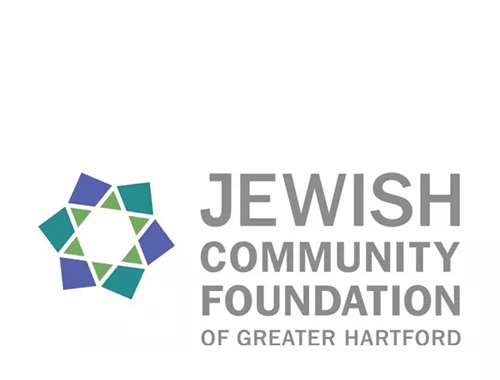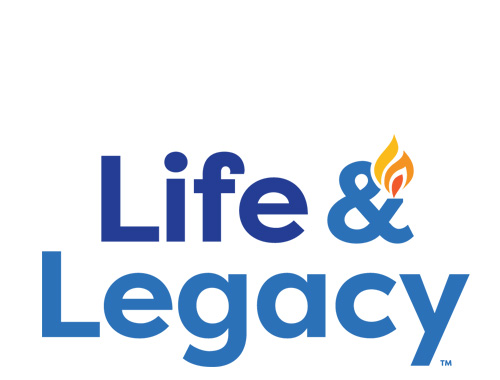Schechter Shavua: August 29, 2025
Home Visits Build Strong Relationships
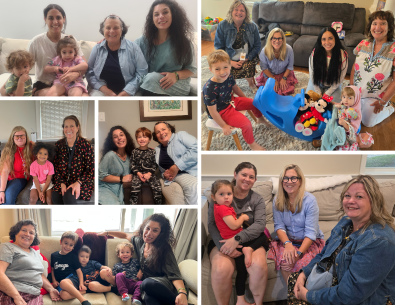 It is a special Schechter tradition that the Early Childhood teachers visit the homes of their students before the first official day of school. These home visits, filled with warmth, joy, and genuine connection, enable our teachers to meet students in the comfort of their own space, where they feel most at ease. This simple but powerful gesture builds trust, sparks excitement, and creates a bridge between home and school. For children returning to Schechter, last week’s home visits brought a sense of familiarity and reassurance; for those attending Schechter for the very first time, it gently eased the uncertainty of a new environment. These visits reminded us that strong relationships are at the heart of learning—and that the first step in any school journey is feeling seen, known, and welcomed.
It is a special Schechter tradition that the Early Childhood teachers visit the homes of their students before the first official day of school. These home visits, filled with warmth, joy, and genuine connection, enable our teachers to meet students in the comfort of their own space, where they feel most at ease. This simple but powerful gesture builds trust, sparks excitement, and creates a bridge between home and school. For children returning to Schechter, last week’s home visits brought a sense of familiarity and reassurance; for those attending Schechter for the very first time, it gently eased the uncertainty of a new environment. These visits reminded us that strong relationships are at the heart of learning—and that the first step in any school journey is feeling seen, known, and welcomed.
Click HERE to view other ways that Schechter teachers help students begin the school year with confidence!
Topics that Make Schechter Teachers Tick
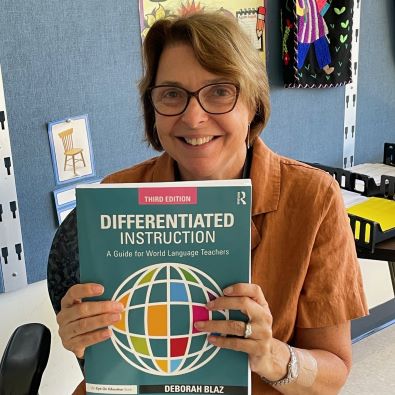 Just as learning and growing is essential for children, Schechter knows that Professional Development helps our faculty continue to evolve and grow as teachers. This summer, each faculty member selected books that spoke to them both personally and professionally, enabling them to delve deeply into a variety of topics including social/emotional concerns for students, specific topics that directly impact their curriculum, the latest educational trends, child development, and more.
Just as learning and growing is essential for children, Schechter knows that Professional Development helps our faculty continue to evolve and grow as teachers. This summer, each faculty member selected books that spoke to them both personally and professionally, enabling them to delve deeply into a variety of topics including social/emotional concerns for students, specific topics that directly impact their curriculum, the latest educational trends, child development, and more.
Anafim teacher (grades 3-4) Erica Moses chose to read Anxiety Relief for Kids by Bridget Flynn Walker, PHD to have a better understanding of how anxiety affects children and their learning. She plans to use many of the strategies as interventions to help her students regain control and peace. In Middle School, Spanish teacher Marilia Castro read Differentiated Instruction in the World Language Classroom by Deborah Blaz because she would like to impact her ability to differentiate her teaching by content, by process, as well as by product. As a result of this summer work, she plans to teach more “tiered” lessons in order to increase student engagement and improve academic performance for all students. Early Childhood teacher Joanne Lerman (EC 3-4 Shorashim Bet) read Calm and in Control: Simple and Effective Strategies to Support Young Children's Self- Regulation by Julie Tourigny, OTD, MS, OTR/L. Throughout her years as a teacher, Joanne has had a passion for helping students who needed guidance with self-regulation; she wanted to learn new strategies to further help those (and all) young children.
These blurbs provide a small taste of the work our faculty does to prepare over the summer. We will continue to highlight the amazing work of our passionate teachers. We are so proud to have them in the Schechter community!
Schoolwide Robotics Initiative Connects to Schechter Core Values
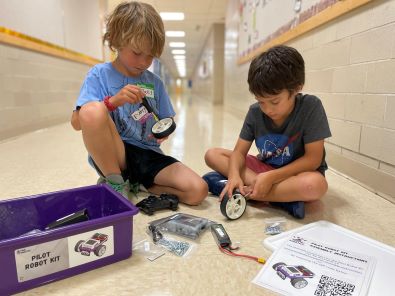 Why Robotics Matters for Students Today
Why Robotics Matters for Students Today
In today’s rapidly changing world, robotics is more than just building machines—it’s about developing critical skills that prepare students for the future while reflecting our core values. Robotics encourages Chochmah (Wisdom) as students ask complex questions, explore multiple solutions, and think critically about how technology impacts the world. It fosters Lev Tov (Good Heart) by promoting teamwork, kindness, and respect as students collaborate and solve problems together with care for our community and environment. Through group projects and shared successes, robotics strengthens Kehillah (Community) , allowing students of all ages to learn from one another and build lasting connections. By exploring the ethics of technology and the role of innovation in society, robotics even provides opportunities to link our learning to Mitzvot (Jewish Practice) and reflect on how we can use our knowledge for good. Finally, as students engage in this cutting-edge field, inspired by the innovation born in Israel, they also experience the global dimension of technology, connecting to the broader Jewish community and the spirit of K’lal Yisrael (Unity) in embracing a future where learning and tradition meet.
Introducing the True Robotics Pilot Robot Program
We’re excited to launch the True Robotics Pilot Robot Program at our school! Through this program, students will learn coding, mechanical design, and problem-solving strategies in a fun, interactive environment. This year, our third and fourth graders will be using the program as part of their science and STEAM classes, giving them hands-on experience building and programming robots using industry-standard tools and technology. The Pilot Program will also guide the work of our brand-new afterschool Robotics class, which is designed for students who want to take their learning even further. There are still a couple of spots open in the afterschool class—so don’t miss this opportunity! We can’t wait to see how this program inspires innovation and sparks curiosity in our young engineers!
I wrote this D’var Torah a year ago, and am sharing it again this year because it feels even more relevant today. Last year, I dedicated it to the memory of Ori Danino, Carmel Gat, Hersh Goldberg-Polin, Alexander Lobanov, Almog Sarusi and Eden Yerushalmi—may their memories be a source of blessing. This year, I also have in mind the thousands of other innocent lives that have been lost since. May we soon see the return of all the hostages, and the dawn of peace.
Parashat Shoftim—the true meaning of leadership
 Our parashah, Shoftim, describes what was to be done in biblical times in response to an unsolved murder. If a corpse was found in Israelite territory, and no one knew the identity of the murderer, then the local magistrates had to identify the town that was closest to the body, and that town had to perform a ritual. First, a cow that had never worked or borne a yoke was slaughtered by a stream; the heifer may have symbolized the innocent victim, and the stream would symbolically wash away the victim’s blood. Then, the town’s elders had to wash their hands over the slain heifer and declare, “Our hands did not shed this blood, nor did our eyes see it done. Absolve, O Lord, Your people Israel whom You redeemed, and do not let guilt for the blood of the innocent remain among Your people Israel.”
Our parashah, Shoftim, describes what was to be done in biblical times in response to an unsolved murder. If a corpse was found in Israelite territory, and no one knew the identity of the murderer, then the local magistrates had to identify the town that was closest to the body, and that town had to perform a ritual. First, a cow that had never worked or borne a yoke was slaughtered by a stream; the heifer may have symbolized the innocent victim, and the stream would symbolically wash away the victim’s blood. Then, the town’s elders had to wash their hands over the slain heifer and declare, “Our hands did not shed this blood, nor did our eyes see it done. Absolve, O Lord, Your people Israel whom You redeemed, and do not let guilt for the blood of the innocent remain among Your people Israel.”
What an astounding proclamation! Based on a midrash, Rashi asks: Would anyone imagine that the town elders were the ones who actually spilled blood? Why would the people need absolution? His answer: the elders were acknowledging the responsibility they bore for neglecting the victim. They may have let him wander without food and company; if they had looked after the safety of the victim, they might have averted his killing.
In other words: the murderer was, without question, the only one guilty of murder—but that is not the end of the conversation. Leaders are responsible for doing all they can to protect their people, and to prevent them from being hurt. Good leaders do not just administer judgment to criminals; they also take responsibility for their negligence, for their decisions that may have allowed for a victim to be harmed. This is among the hardest tasks for a leader—but it is a crucial one. In Israel and in the United States, may we be blessed with strength, with lasting peace—and with leaders who truly take responsibility for their actions and their failings.
Shabbat shalom,
Rabbi Jonathan Berger
Head of School
Solomon Schechter Day School
of Greater Hartford
26 Buena Vista Road
West Hartford, CT 06107
© Solomon Schechter Day School of Greater Hartford | Site design Knowles Kreative

